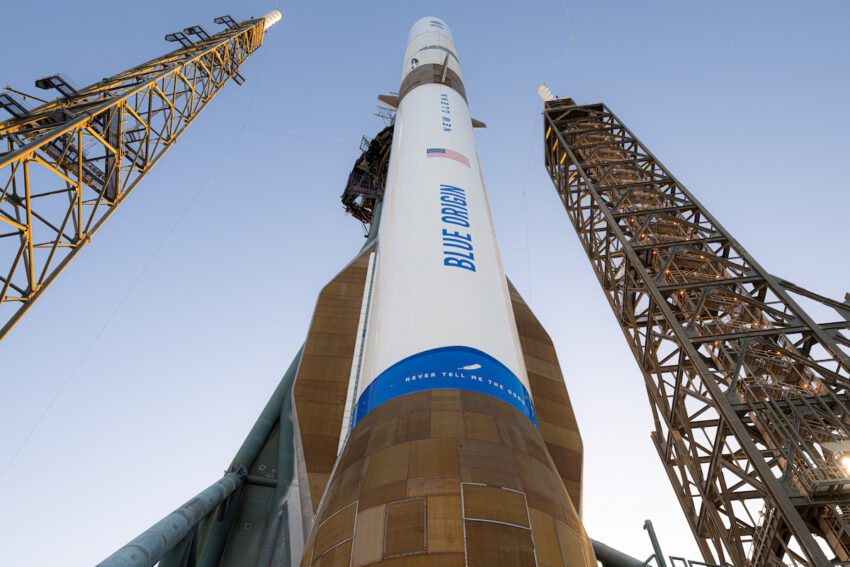
blue origin scrubs second new glenn launch Blue Origin has postponed its second New Glenn launch, rescheduling the attempt for November 12, 2025, as the company continues its efforts to establish a reliable and reusable rocket system.
blue origin scrubs second new glenn launch
Background on Blue Origin and New Glenn
Founded by Amazon’s Jeff Bezos in 2000, Blue Origin has been a significant player in the commercial space industry, focusing on developing technologies to enable private human access to space. The company has made headlines for its ambitious projects, including the New Shepard suborbital vehicle and the New Glenn orbital launch vehicle. The New Glenn, named after astronaut John Glenn, is designed to be a heavy-lift rocket capable of carrying both crewed and uncrewed missions into orbit.
The New Glenn rocket stands out due to its reusability, a feature that Blue Origin emphasizes as a means to reduce the cost of access to space. The rocket is designed to be capable of returning to Earth and being refurbished for multiple flights, similar to SpaceX’s Falcon 9. This capability is crucial for Blue Origin as it seeks to compete in a growing market for satellite launches and other space missions.
The Importance of the Upcoming Launch
The upcoming launch is particularly significant for Blue Origin. It represents not only a technical milestone but also a critical step in the company’s strategy to secure commercial contracts. The New Glenn is expected to deliver its first commercial payloads, which will help validate its capabilities and reliability in the eyes of potential customers.
As the space industry evolves, the demand for reliable launch services has increased. Companies and governments are looking for partners who can provide consistent and cost-effective access to space. Blue Origin’s ability to demonstrate the New Glenn’s reusability and performance will be vital in attracting contracts from satellite operators and other commercial entities.
Challenges Faced by Blue Origin
Despite its ambitious goals, Blue Origin has faced several challenges in the development and testing of the New Glenn rocket. The decision to scrub the second launch attempt is a reminder of the complexities involved in rocket launches. Technical issues, weather conditions, and logistical challenges can all contribute to delays.
In the lead-up to the launch, Blue Origin had been preparing for a series of tests and evaluations to ensure the rocket’s systems were functioning as intended. Any anomalies detected during these preparations can lead to a postponement, as safety remains a top priority for the company. The need for thorough testing is particularly critical for a new rocket system, where unanticipated issues can arise.
Technical Considerations
The New Glenn rocket features a number of advanced technologies designed to enhance its performance and reusability. It is powered by Blue Origin’s BE-4 engines, which are among the most powerful rocket engines currently in development. The BE-4 engines are designed to provide significant thrust while being capable of multiple flights, which is essential for the reusability aspect of the New Glenn.
Moreover, the rocket’s design incorporates a two-stage configuration, allowing it to carry heavier payloads into orbit. The first stage is intended to return to Earth for refurbishment, while the second stage is designed to deliver payloads to their intended orbits. This dual-stage approach is crucial for maximizing the rocket’s efficiency and cost-effectiveness.
Market Competition
Blue Origin is entering a competitive landscape dominated by established players such as SpaceX and United Launch Alliance (ULA). SpaceX, in particular, has set a high bar with its Falcon 9 and Falcon Heavy rockets, both of which have demonstrated remarkable reliability and reusability. The success of these rockets has allowed SpaceX to capture a significant share of the commercial launch market.
In this context, Blue Origin’s ability to successfully launch and recover the New Glenn will be closely watched by industry analysts and potential customers. The company must not only prove the rocket’s technical capabilities but also demonstrate its reliability over multiple flights. This will be essential for building trust with clients who are considering Blue Origin for their launch needs.
Stakeholder Reactions
The decision to scrub the launch has elicited a range of reactions from stakeholders in the space industry. Investors, analysts, and potential customers are all keenly aware of the implications of the New Glenn’s performance. For investors, the successful launch of the New Glenn could enhance Blue Origin’s valuation and position in the market. Conversely, delays can lead to concerns about the company’s ability to deliver on its promises.
Potential customers, including satellite operators and government agencies, are also watching closely. They are interested in understanding the reliability of the New Glenn as they consider future contracts. A successful launch on November 12 could bolster confidence in Blue Origin’s capabilities, while any further delays could raise questions about the company’s readiness to compete effectively.
Future Implications
The implications of the upcoming New Glenn launch extend beyond Blue Origin itself. The success or failure of this mission will have ripple effects throughout the commercial space industry. A successful launch could encourage more companies to invest in reusable rocket technologies, potentially leading to a new era of lower-cost access to space.
Moreover, if Blue Origin can establish itself as a reliable launch provider, it could lead to increased competition in the market, benefiting customers through lower prices and more options. This could also stimulate innovation as companies strive to differentiate themselves in a crowded marketplace.
Regulatory Considerations
As Blue Origin prepares for the New Glenn launch, it must also navigate the regulatory landscape governing commercial space activities. The Federal Aviation Administration (FAA) plays a crucial role in overseeing launch operations, ensuring safety, and managing airspace during launches. Blue Origin must comply with all regulatory requirements, which can add another layer of complexity to its launch schedule.
Any delays in obtaining necessary approvals or addressing regulatory concerns can further impact the timeline for the New Glenn’s operational debut. The company has been proactive in engaging with regulators, but the evolving nature of the space industry means that regulatory challenges can arise unexpectedly.
Conclusion
The rescheduling of the New Glenn launch to November 12, 2025, underscores the challenges faced by Blue Origin as it seeks to establish itself in the competitive commercial space market. The upcoming launch is not just a technical milestone; it represents a critical opportunity for the company to demonstrate its capabilities and secure commercial contracts. As the space industry continues to evolve, the success of the New Glenn will have significant implications for Blue Origin and the broader landscape of commercial spaceflight.
Source: Original report
Was this helpful?
Last Modified: November 10, 2025 at 7:39 am
3 views















